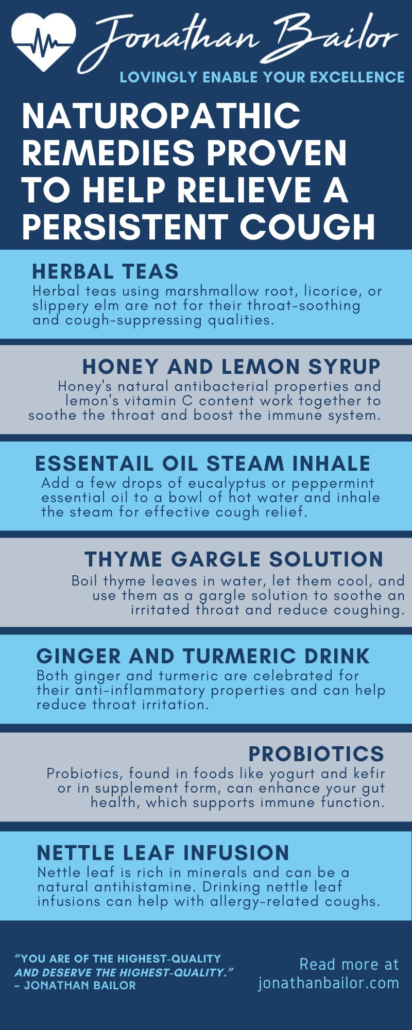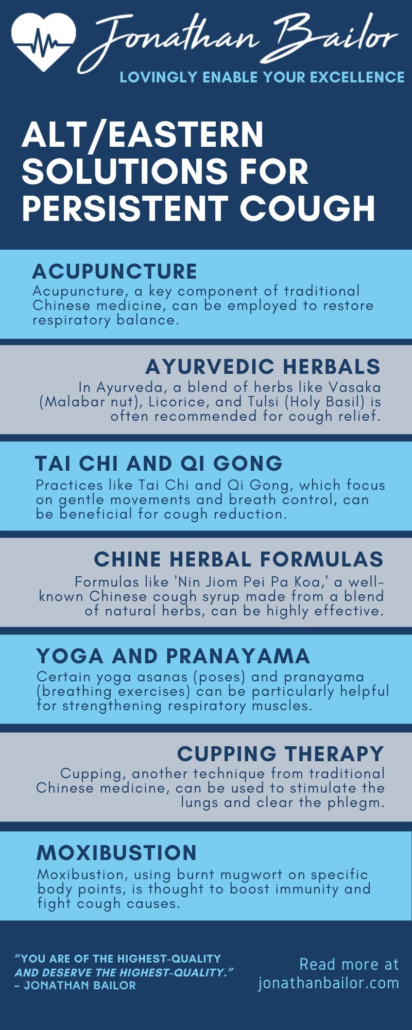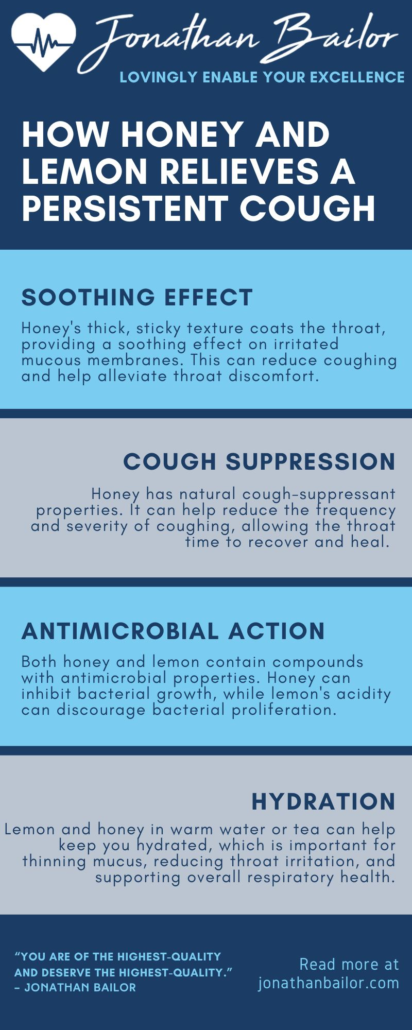14 Evidence-Based Home Remedies For Persistent Cough
In this coughing and phlegm guide with Jonathan Bailor, you get to dive into 14 evidence based home remedies for persistent cough like never read before!
Welcome to a world where the whispers of nature hold the key to soothing that nagging chronic cough, aka upper airway cough syndrome. In this journey of discovery, we delve into evidence-based home remedies that offer relief and comfort, harnessing the gentle power of natural ingredients. These remedies are not just about treating occasional cough symptoms; they’re about embracing a holistic approach to health that resonates with our innate healing abilities.
If you need more cough and phlegm help then make sure to check out our jam packed Solving the Mystery of Phlegm After Eating: 10 Causes and Easy Solutions and 26 Tips for Managing Chronic Coughs Without Medication guides!
Each remedy in this guide is a testament to the wisdom that lies in simplicity. They are easily accessible, profoundly effective, and grounded in a profound understanding of how our bodies interact with the natural world. This isn’t just about finding temporary relief; it’s about nurturing a deeper connection with the healing forces around us.
This guide is a treasure trove of solutions that have stood the test of time, been passed down through generations, and are now shared with you. Whether it’s a soothing tea or a calming inhalant, these remedies are more than just treatments; they are a ritual of self-care and respect for our bodies.
As you explore these remedies, imagine sharing this knowledge with those around you. Picture the conversations it could spark, the relief it could bring, and the bonds it could strengthen. This isn’t just personal healing; it’s about fostering a community of care and understanding.
So, let’s embark on this journey together, unlocking the secrets of nature to find relief and comfort in the face of a persistent cough. Share this article with your friends, family, and social networks, and let’s spread the wisdom of natural healing far and wide.
Naturopathic Remedies for Persistent Cough Relief
1. Herbal Teas with Antitussive Properties
Brew a soothing cup of herbal tea using herbs like marshmallow root, licorice, or slippery elm. These herbs are known for their antitussive (cough-suppressing) qualities and can provide a soothing coat to an irritated throat, reducing the urge to cough. These herbal teas can also reduce frequent throat clearing. In essence, they can effectively relieve chronic coughing.
2. Honey and Lemon Syrup
Mix raw honey with fresh lemon juice to create a natural cough syrup. Honey’s natural antibacterial properties and lemon’s vitamin C content work together to soothe the throat and boost the immune system. This remedy is not only effective for the relief of chronic cough symptoms but also a pleasant, natural alternative to over-the-counter syrups. This naturopathic remedy is so effective that honey and lemon are featured prominently in cough drops.
3. Essential Oil Steam Inhalation
Add a few drops of eucalyptus or peppermint essential oil to a bowl of hot water and inhale the steam. These oils have natural decongestant properties and can help open up the airways, making breathing easier and reducing cough frequency.
4. Thyme Gargle Solution
Create a gargle solution with thyme, known for its antispasmodic and antibacterial properties. Boil thyme leaves in water, let them cool, and use them as a gargle solution to soothe an irritated throat and reduce coughing.
5. Ginger and Turmeric Drink
Combine ginger and turmeric in a warm drink. Both ginger and turmeric are celebrated for their anti-inflammatory properties and can help reduce throat irritation, thus calming the cough reflex. This warming drink can also boost your immune response, aiding in quick recovery.
6. Probiotics for Immune Support
Incorporate probiotics into your diet. Probiotics, found in foods like yogurt and kefir or in supplement form, can enhance your gut health, which is directly linked to immune function. A stronger immune system can be more effective in combating the root causes of a persistent cough.
7. Nettle Leaf Infusion
Nettle leaf is rich in minerals and can act as a natural antihistamine. Drinking nettle leaf infusion can help alleviate coughs related to allergies, as it reduces inflammation and histamine production in the body.

Feeling Better Is Priceless, That's Why We Don't Put A Price On It!
“It’s Like A Free and Medically Valid Version of Noom and Weight Watchers Online”
~ Dr. Doctor Matthew Oleshiak, MD
Click the 'LEARN MORE' button below for free lifetime access to the fast fix program developed by Jonathan and top Ivy League Medical Doctors
LEARN MOREP.S. It's not a free trial. It's not part of the program for free. The entire program is free, forever, for real! No credit card needed.
Alternative and Eastern Medicine Solutions for Persistent Cough Relief
1. Acupuncture for Respiratory Balance
Acupuncture, a key component of traditional Chinese medicine, can be employed to restore respiratory balance. By targeting specific points in the body, it helps to regulate the flow of Qi (energy) and blood, thereby alleviating cough and improving lung function.
2. Ayurvedic Herbal Concoctions
In Ayurveda, a blend of herbs like Vasaka (Malabar nut), Licorice, and Tulsi (Holy Basil) is often recommended for cough relief. These herbs have expectorant properties and help soothe the throat, clear mucus, and enhance immunity.
3. Tai Chi and Qi Gong
Practices like Tai Chi and Qi Gong, which focus on gentle movements and breath control, can be beneficial. These exercises enhance lung capacity and promote the flow of Qi, reducing the frequency and intensity of coughing.
4. Traditional Chinese Herbal Formulas
Formulas like ‘Nin Jiom Pei Pa Koa,’ a well-known Chinese cough syrup made from a blend of natural herbs, can be highly effective. These formulas are designed to address the root cause of the cough, thus balancing the body’s energies and providing symptomatic relief.
5. Yoga and Pranayama
Certain yoga asanas (poses) and pranayama (breathing exercises) can be particularly helpful. Practices like ‘Anulom Vilom’ (alternate nostril breathing) and ‘Bhujangasana’ (cobra pose) help clear the air passages and strengthen respiratory muscles.
6. Cupping Therapy for Lung Health
Cupping, another technique from traditional Chinese medicine, can be used to stimulate the lungs and clear the phlegm. The suction created by the cups on the back helps open the chest and improve respiratory function.
7. Moxibustion for Immune Boosting
Moxibustion, which involves burning mugwort near certain points on the body, is believed to strengthen the immune system and improve the body’s ability to combat the root causes of cough. This technique is often used in combination with acupuncture for enhanced effects.

Frequently Asked Questions on Coughing & Phlegm
Q1: What causes phlegm to accumulate during a cough?
Phlegm accumulation during a cough is often a response of the respiratory system to an irritant or infection. When your body detects these issues, it produces extra mucus as a protective measure to trap and remove the irritants, like allergens, bacteria, or viruses. This is what causes postnasal drip. Chronic obstructive pulmonary disease (COPD) and gastroesophageal reflux disease (chronic acid reflux, or GERD) are conditions that can cause phlegm accumulation. Persistent phlegm can indicate a need for the body to continually defend itself against ongoing irritation or infection.
Q2: How can I differentiate between a viral and bacterial cough?
A viral cough, often associated with an upper respiratory tract infection like the common cold, typically presents as a dry cough initially and then becomes productive with clear or white phlegm. Bacterial coughs, as can occur with chronic bronchitis and whooping cough, on the other hand, might produce yellow or green phlegm, indicating an infection that may require medical attention. Persistent, high-fever, or worsening symptoms can also hint at a bacterial origin.
Q3: Are over-the-counter cough medicines effective for all types of coughs?
Over-the-counter cough medicines can provide relief, but their effectiveness varies. Expectorants help thin and loosen mucus, making it easier to cough up, while suppressants reduce the urge to cough. However, they are not universally effective for all coughs, especially those caused by underlying conditions. It’s always a good idea to consult with a healthcare professional for persistent or severe coughs.
Q4: Can lifestyle changes help reduce phlegm and ease coughing?
Yes, lifestyle changes can significantly impact coughing and phlegm production. Staying hydrated helps thin mucus, making it easier to expel. Avoiding irritants like tobacco smoke and polluted air can reduce coughing. Adequate rest and a balanced diet also support the immune system, potentially shortening the duration of a cough.
Q5: When should I seek medical attention for a cough?
Seek medical attention if your cough is persistent, worsens over time, or is accompanied by alarming symptoms like high fever, chest pain, shortness of breath, or blood in the phlegm. A healthcare professional can determine the cause of the cough and suggest appropriate treatment, especially if it’s a symptom of a more serious underlying cause.

A Breath of Fresh Relief: Embracing Wellness Together
As we conclude our exploration of home remedies and treatments to alleviate persistent coughs and phlegm buildup, remember that each step toward wellness is a shared journey. These insights offer more than personal relief; they’re an opportunity to enhance the well-being of our loved ones. So, don’t hesitate to spread this knowledge. Share this article with friends and family and on social media. Your gesture of caring could be the key to someone else’s comfort this cold season. Together, let’s breathe easier, embracing health and vitality in every season of life.
Feeling Better Is Priceless, That's Why We Don't Put A Price On It!
“It’s Like A Free and Medically Valid Version of Noom and Weight Watchers Online”
~ Dr. Doctor Matthew Oleshiak, MD
Click the 'LEARN MORE' button below for free lifetime access to the fast fix program developed by Jonathan and top Ivy League Medical Doctors
LEARN MOREP.S. It's not a free trial. It's not part of the program for free. The entire program is free, forever, for real! No credit card needed.




